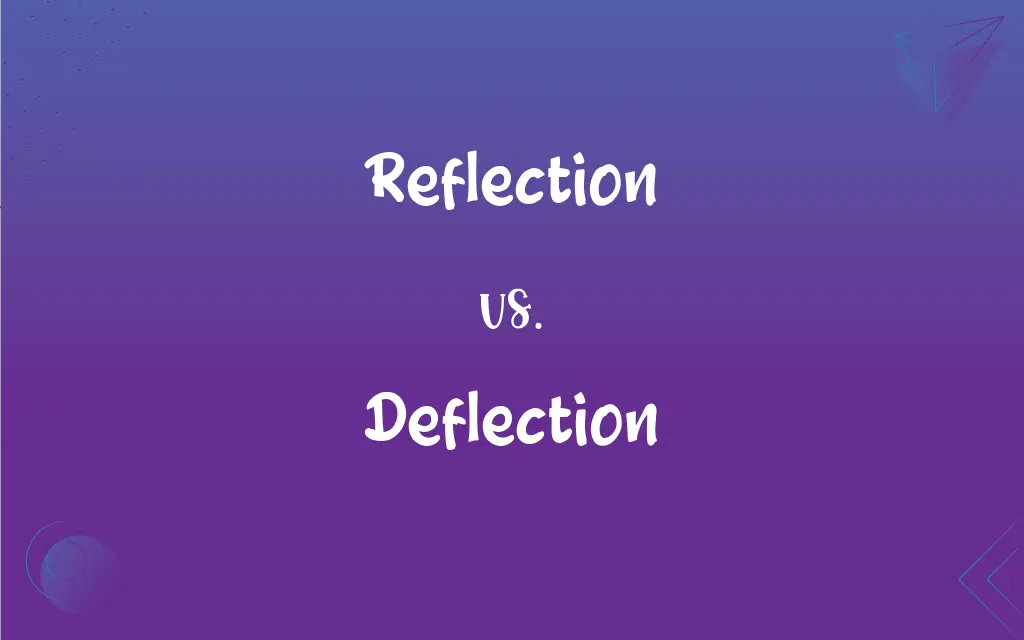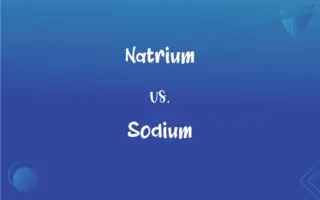Reflection vs. Deflection: What's the Difference?
Edited by Harlon Moss || By Janet White || Published on January 5, 2024
Reflection involves bouncing back light, sound, or an image from a surface, whereas deflection is the act of turning aside or changing direction, often of an object in motion.

Key Differences
Reflection occurs when waves, such as light or sound, bounce off a surface and return, while deflection involves an object or wave being diverted from its original path.
In optics, reflection is seen in mirrors where light rays bounce back to form an image; in deflection, light rays can be bent as in the case of refraction. In acoustics, reflection creates echoes, whereas deflection might involve sound waves being redirected by obstacles.
Reflection can also mean contemplation or thoughtful consideration, while deflection can refer to avoiding or shifting attention away from a subject or emotion.
In engineering, reflection is considered in designing soundproof rooms or antennas, whereas deflection is critical in structures to distribute forces or loads.
The word "reflection" often connotes introspection and careful thought, while "deflection" can imply avoidance or evasion.
ADVERTISEMENT
Comparison Chart
Definition
Bouncing back of waves or thoughts
Turning aside or changing direction
Physical Example
Light reflecting off a mirror
Projectile deflecting off a surface
Metaphorical Use
Deep contemplation or consideration
Evasion or avoidance of a topic
Importance in Science
Studied in optics, acoustics
Considered in physics, engineering
Emotional Connotation
Introspection, self-awareness
Evasion, redirection of attention
ADVERTISEMENT
Linguistic Context
Often used in intellectual, thoughtful terms
Common in discussions of conflict or avoidance
Reflection and Deflection Definitions
Reflection
Reflection is the act of light, sound, or images being bounced back from a surface.
The reflection of the trees on the lake was breathtaking.
Deflection
In physics, deflection refers to the deviation of an object from its intended path.
The deflection of light through a prism creates a spectrum of colors.
Reflection
In mathematics, reflection is flipping a figure to produce a mirror image.
The geometry problem involved the reflection of a triangle over a line.
Deflection
Deflection is the act of turning aside or changing direction.
The deflection of the soccer ball by the goalie was a game-saving move.
Reflection
Reflection also refers to serious thought or contemplation.
His quiet time in the morning was for reflection on his goals.
Deflection
In engineering, deflection refers to the degree a structural element is displaced under a load.
They measured the beam's deflection under stress during the test.
Reflection
Reflection in physics describes the change in direction of a wavefront.
The reflection of sound waves causes echoes in a canyon.
Deflection
Deflection can imply avoiding a topic or shifting focus in conversation.
His deflection from the sensitive subject was noticeable.
Reflection
Reflection can mean an expression or manifestation of something else.
Her kindness is a reflection of her good upbringing.
Deflection
Deflection is also used in sports to describe a change in direction of a ball or player.
The player's deflection of the ball led to an unexpected goal.
Reflection
The act of reflecting or the state of being reflected.
Deflection
The act of deflecting or the condition of being deflected.
Reflection
Something, such as light, radiant heat, sound, or an image, that is reflected.
Deflection
(Sports) A shot or pass that is sent without stopping in a different direction by a second offensive player.
FAQs
What is reflection?
Reflection is the bouncing back of waves, like light or sound, from a surface.
Is deflection important in sports?
Yes, in sports, deflection is key in changing the direction of balls or players.
What is self-reflection?
Self-reflection is the process of thinking deeply about one's own thoughts and feelings.
Can reflection occur with sound?
Yes, reflection occurs with sound waves, creating echoes.
How is deflection used in conversation?
In conversation, deflection is used to change the subject or avoid certain topics.
What causes deflection in physics?
Deflection in physics is caused by forces or interactions changing an object's path.
What is deflection?
Deflection is the act of turning or moving something aside from its path.
What materials are best for reflection?
Smooth, shiny surfaces like mirrors are best for light reflection.
How is reflection used in photography?
In photography, reflection is used creatively to capture mirrored images.
How does reflection work in mirrors?
In mirrors, reflection causes light rays to bounce back, creating an image.
What role does reflection play in learning?
Reflection in learning involves thinking deeply about what has been taught.
What is an example of deflection in everyday life?
An example is a car swerving to avoid an obstacle on the road.
Is reflection always visible?
Reflection is not always visible, as in the case of sound waves.
Does deflection occur in nature?
Yes, deflection occurs naturally, like light deflecting in the atmosphere.
Can deflection be intentional in design?
Yes, deflection can be intentionally used in design, like in aerodynamics.
How do buildings account for deflection?
Buildings are designed to handle deflection caused by wind or weight.
Is deflection a defense mechanism?
Yes, deflection can be a psychological defense mechanism to avoid distress.
What's the difference in reflection in calm vs. turbulent water?
Calm water produces clear reflections, while turbulent water distorts them.
Can deflection be measured?
Yes, deflection can be measured, especially in engineering and physics.
Can reflection be misleading?
Yes, reflections can sometimes create optical illusions or be misinterpreted.
About Author
Written by
Janet WhiteJanet White has been an esteemed writer and blogger for Difference Wiki. Holding a Master's degree in Science and Medical Journalism from the prestigious Boston University, she has consistently demonstrated her expertise and passion for her field. When she's not immersed in her work, Janet relishes her time exercising, delving into a good book, and cherishing moments with friends and family.
Edited by
Harlon MossHarlon is a seasoned quality moderator and accomplished content writer for Difference Wiki. An alumnus of the prestigious University of California, he earned his degree in Computer Science. Leveraging his academic background, Harlon brings a meticulous and informed perspective to his work, ensuring content accuracy and excellence.





































































